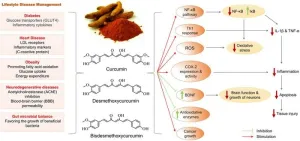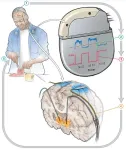(Press-News.org) MINNEAPOLIS/ST. PAUL (08/19/2024) — Mindfulness-based interventions delivered via telehealth in a scalable format can improve pain and overall well-being among veterans with chronic pain, according to new research published today in JAMA Internal Medicine.
In a randomized clinical trial, researchers aimed to test the effectiveness of two eight-week telehealth mindfulness-based interventions (MBIs) designed to be scalable and widely implemented in healthcare systems. MBIs help people pay attention non-judgmentally in the present moment and often involve practices like meditation, breathing exercises or gentle movement.
“Although mindfulness interventions are evidence-based treatment for chronic pain and conditions that often accompany pain, like anxiety and depression, many MBIs are difficult to implement at scale in healthcare systems. They require trained mindfulness instructors, dedicated space and pose barriers to patients due to the time commitment involved,” said Diana Burgess, PhD, a professor at the University of Minnesota Medical School and an investigator at the Minneapolis Veteran Affairs (VA) Healthcare System. “We wanted to develop MBIs that were relatively low resource, scalable and more accessible for patients ”
Between November 2020 and May 2022, 811 veterans with moderate to severe chronic pain participated in the Learning to Apply Mindfulness to Pain (LAMP) study at three VA facilities. Outcomes were assessed at outset, 10 weeks, six months and one year. The group MBI was conducted via video conference with pre-recorded mindfulness education and skill training videos, accompanied by discussions led by a trained facilitator who was not an expert in mindfulness. The self-paced MBI was asynchronous — allowing participants to engage with the MBI at their own pace — and supplemented with three individual facilitator calls.
Key findings from the study include:
Pain-related function improved significantly for patients in the group and self-paced MBIs.
There were significant improvements in pain intensity, physical functioning, fatigue, sleep disturbance, social functioning, depression and PTSD among patients in the group and self-paced MBIs over 12 months, compared to usual care.
The group and self-paced MBIs did not significantly differ from each other.
The results of this study suggest low-resource, telehealth-based MBIs could help accelerate and improve the implementation of non-medication pain treatment in VA healthcare and beyond.
Dr. Burgess and the research team are leading a new project — called Rural Veterans Applying Mind Body Skills for Pain (RAMP) — which will test the effectiveness of a scalable, mind-body telehealth intervention for chronic pain, designed for veterans living in rural areas. RAMP builds on LAMP through its use of mindfulness practices while also incorporating pain education, physical and rehabilitative exercise, and cognitive and behavioral strategies.
Funding was provided by the Department of Defense through the Pain Management Collaboratory - Pragmatic Clinical Trials Demonstration Projects [W81XWH-18-2-0003]. The research was also supported by the National Center for Complementary and Integrative Health [U24AT009769] and the Office of Behavioral and Social Sciences Research.
###
About the University of Minnesota Medical School
The University of Minnesota Medical School is at the forefront of learning and discovery, transforming medical care and educating the next generation of physicians. Our graduates and faculty produce high-impact biomedical research and advance the practice of medicine. We acknowledge that the U of M Medical School is located on traditional, ancestral and contemporary lands of the Dakota and the Ojibwe, and scores of other Indigenous people, and we affirm our commitment to tribal communities and their sovereignty as we seek to improve and strengthen our relations with tribal nations. For more information about the U of M Medical School, please visit med.umn.edu.
END
New research finds scalable mindfulness interventions delivered via telehealth improve pain and well-being for veterans with chronic pain
2024-08-19
ELSE PRESS RELEASES FROM THIS DATE:
Current HIV prevention medication users often stigmatize other PrEP users as ‘promiscuous’
2024-08-19
Novel findings attend to attitudes of the stigmatized, rather than stigmatizers
Past research identified perception of promiscuity and assumptions that PrEP users are HIV-positive as key drivers of perceived stigma
Perception of stigma is highest among those who believe their sexual behavior puts them at risk for HIV
Knowing others who use PrEP does not influence one’s fear of potential discrimination
CHICAGO --- Public health messaging that drives stigma around Pre-exposure Prophylaxis (PrEP), a medication that can reduce HIV risk by up to 99%, appears to play a role in uptake of the medication. While the potential mismarketing of the drug is well-understood and ...
How "winner and loser effects" impact social rank in animals - and humans
2024-08-19
Research has shown that in many animals, the winners of a fight are more likely to win subsequent contests, while the losers tend to lose their following fights. In experiments where male stickleback fish were randomly introduced to another fish, 65% of the winning fish won the second match, while all losing fish lost the second contest.
Such winner and loser effects can greatly influence individual behavior and fitness. This effect happens in humans as well. In "Winner and Loser Effects and Social Rank in Humans," recently published in The Quarterly Review of Biology, authors Noah M. T. Smith and Reuven ...
Research study examines Alzheimer’s disease drug on tissue samples from people with Down syndrome
2024-08-19
People with Down syndrome are likely to develop Alzheimer’s disease at a young age, with autopsy studies showing that by age 40 years, the brains of individuals with Down syndrome have amyloid plaques. Yet people with Down syndrome have been excluded from or underrepresented in clinical trials of new therapies for treating AD. Lecanemab, which has been shown to target and remove beta-amyloid plaques, has been approved by the U.S. Food and Drug Administration to treat AD early in the disease’s progression. ...
International Society of Biomechanics recommendations for wearables-based motion capture
2024-08-19
Dr. Reed Gurchiek, an Assistant Professor in the Department of Bioengineering, Clemson University, and an Early-stage Investigator, was a co-first author of a recent publication in the Journal of Biomechanics titled “International Society of Biomechanics recommendations on the definition, estimation, and reporting of joint kinematics in human motion analysis applications using wearable inertial measurement technology”. A collaborative effort that incorporated feedback from the biomechanics community has produced recommendations in five categories: sensor characteristics ...
Rutgers researchers discover new way to control the sense of touch
2024-08-19
Rutgers researchers have found a new way to manage the receptors that control the sense of touch, which could lead to treating chronic pain more effectively.
“Identifying a natural molecule that specifically reduces pain sensitivity offers hope for new therapeutic strategies in the management of pain,” said Tibor Rohacs, a professor in the Department of Pharmacology, Physiology and Neuroscience at Rutgers New Jersey Medical School and a member of the Rutgers Brain Health Institute. “Our goal is to translate these findings into effective treatments that improve the quality of life for people suffering from chronic ...
New UH study targets early signs of vision loss in diabetic patients
2024-08-19
A $3.3 million study at the University of Houston College of Optometry will track the health of patients with prediabetes and diabetes to find out who might develop eye problems and be at risk for future vision loss. The study is being led by Wendy Harrison, associate professor, and is underwritten by the National Eye Institute.
Vision loss in type 2 diabetes results from diabetic retinopathy, caused by damage to blood vessels in the retina, the light-sensitive layer of tissue in the back of your eye. The disease can appear without warning.
“The ...
Herbal-based nutraceuticals in management of lifestyle diseases: Experience from Indian population
2024-08-19
Lifestyle diseases, also known as non-communicable diseases (NCDs), have emerged as a major health burden globally, including in India. These diseases, such as obesity, diabetes, hypertension, cardiovascular diseases, and metabolic disorders, are primarily caused by unhealthy lifestyle choices like sedentary behavior, poor dietary habits, and stress. According to the World Health Organization (WHO), NCDs are responsible for 41 million deaths annually, accounting for 74% of all global deaths. Notably, 86% of these premature deaths occur in low- and middle-income countries.
The increasing prevalence of lifestyle diseases ...
Taming Parkinson’s disease with intelligent brain pacemakers
2024-08-19
Media Contact: Robin.Marks@ucsf.edu, (415) 502-6397
Subscribe to UCSF News
Taming Parkinson’s Disease with Intelligent Brain Pacemakers
UCSF studies show personalized, self-adjusting, neuromodulation has the potential to enhance movement and sleep.
Two new studies from UC San Francisco are pointing the way toward round-the-clock personalized care for people with Parkinson’s disease through an implanted device that can treat movement problems during the day and insomnia at night.
The approach, called adaptive deep brain stimulation, or aDBS, uses methods derived from AI to ...
Self-adjusting brain pacemaker may help reduce Parkinson’s disease symptoms
2024-08-19
A small feasibility study funded by the National Institutes of Health (NIH) found that an implanted device regulated by the body’s brain activity could provide continual and improved treatment for the symptoms of Parkinson’s disease (PD) in certain people with the disorder. This type of treatment, called adaptive deep brain stimulation (aDBS), is an improvement on a technique that has been used for PD and other brain disorders for many years. The study found aDBS was markedly more effective at controlling PD symptoms compared to conventional DBS treatments.
“This study marks a big step forward towards ...
Florida’s red flag gun law and firearm and nonfirearm homicide and suicide rates
2024-08-19
About The Study: Although firearm homicide mortality increased after Florida’s red flag law enactment (permitting the temporary removal of firearms by law enforcement officers from individuals posing a danger to themselves or others), this increase was lower than expected compared with its synthetic control, resulting in an 11% rate reduction (0.73 fewer deaths per 100,000). There were no differences from expected mortality rates for nonfirearm homicide, firearm suicide, or nonfirearm suicide.
Corresponding Author: To contact the corresponding author, Catherine Gimbrone, MPH, email c.gimbrone@columbia.edu.
To ...


